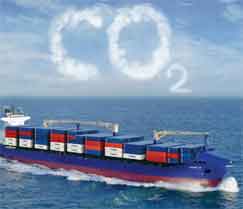A number of companies connected to the ocean freight industry are joining to launch a new research center that will develop new fuel types and technologies as part of the industry's commitment to reduce its global carbon emissions.
The new center will go by name of the Maersk McKinney Moller Center for Zero Carbon Shipping, made possible by a start-up donation of $60 million by the A.P. Moller Foundation. The founding companies include ABS, A.P. Moller Maersk (parent of Maersk Line), Cargill, MAN Energy Solutions, Mitsubishi Heavy Industries, NYK Line and Siemens Energy.
Supply Chain Digest Says... |
 |
| The industry is also reluctant to invest in next-generation alternative fuel ships that don't yet exist and have uncertain futures. |
 |
What do you say? |
| Click here to send us your comments |
| |
| Click here to see reader feedback |
|
|
As an independent, non-profit research center, it will work across the entire shipping sector with industry, academia, and governments. The goal is to collaborate globally to, accelerate the development of selected decarbonizing fuels and power technologies, and support the establishment of regulatory, financial, and commercial means to enable transformation in the sector.
The ocean shipping industry is estimate to create 2-3% of global carbon emissions. While the industry has made commitments to eliminate carbon emissions within this century, the Center says achieving this goal is going to require the development of viable new technologies as well as new legislation to enable the transition towards decarbonization.
The International Maritime Organization (IMO) has pledged that the industry will improve fuel efficiency by 30% by 2025 and slash greenhouse-gas emissions by half by 2050 from 2008 levels.
The shipping industry was largely left out of the 2015 Paris Climate Accords, in part because those commitments to the UN group were at a country-specific level, making it hard to track progress from ocean-travelling bulk and container ships.
The Center hopes to lead the industry to a 40% relative reduction by 2030.But achieving the long-term zero-emissions target will require new fuel types and a systemic changes within the industry.
However, while Maersk is leading the longer term effort with this move, in the short term struggling shipping lines are putting the environment on the back burner.
With shipping volumes way down due to the virus crisis, a survey of members of the European Community Shipowners' Associations, a major organization of ship owners, found that three-quarters of its members would either halt or reduce investments in cleaner ships due to financial considerations.
(See More Below
|
CATEGORY SPONSOR: SOFTEON |
|
|
|
|
|
 An article in the Wall Street Journal this week noted that "With the global economy and trade spiraling downward this year and prospects for a recovery deeply uncertain, the priority for many shipowners will be staying in business, leaving climate-change considerations on the back burner." An article in the Wall Street Journal this week noted that "With the global economy and trade spiraling downward this year and prospects for a recovery deeply uncertain, the priority for many shipowners will be staying in business, leaving climate-change considerations on the back burner."
The shipping industry is already expected to spend tens of billions of dollars annually for years to come to comply with IMO rules on reducing sulfur emissions, achieved either by using a more expensive fuel or installing expensive scrubbers on ships.
The industry is also reluctant to invest in next-generation alternative fuel ships that don't yet exist and have uncertain futures.
Ioanna Procopiou, CEO of Greece-based shipping consulting firm Prominence Maritime, said during a recent webinar that "A lot of what is being suggested is not practical or available on a large scale, and in many cases it does not even yield the environmental benefit that is intended."
All that leaving the chances of the industry meeting its emissions targets in the short to mid-term seemingly very low.
Any reaction to these news stories on ocean shipping in CO2? Let us know your thoughts at the Feedback section below.
Your Comments/Feedback
|

